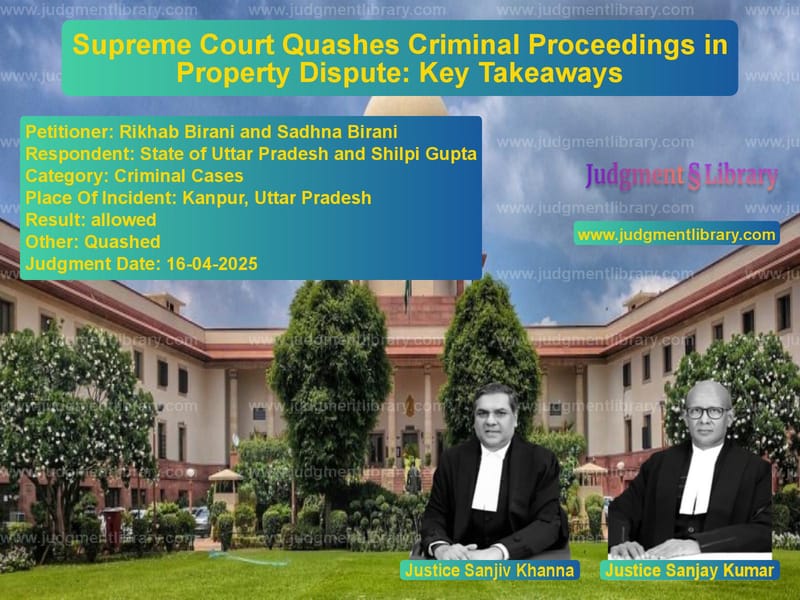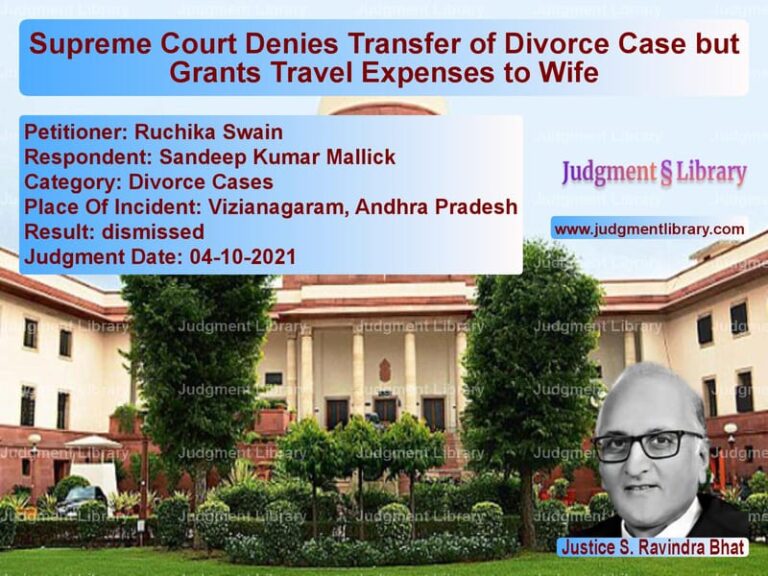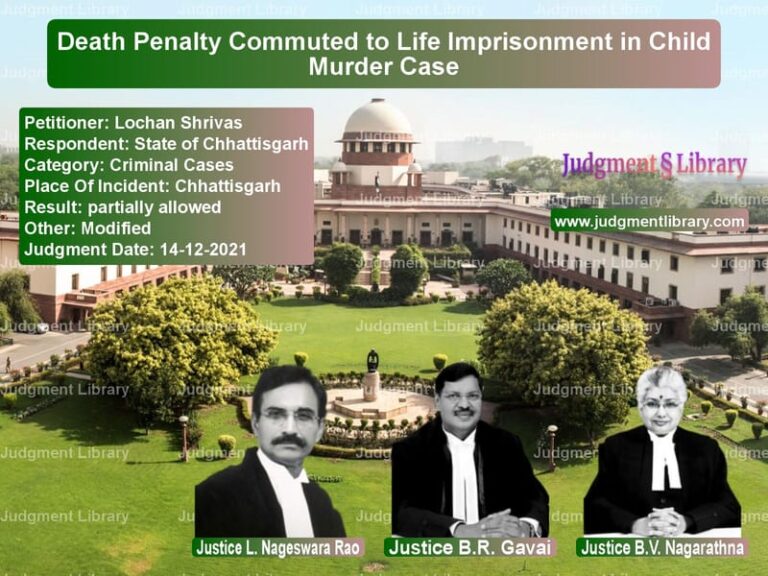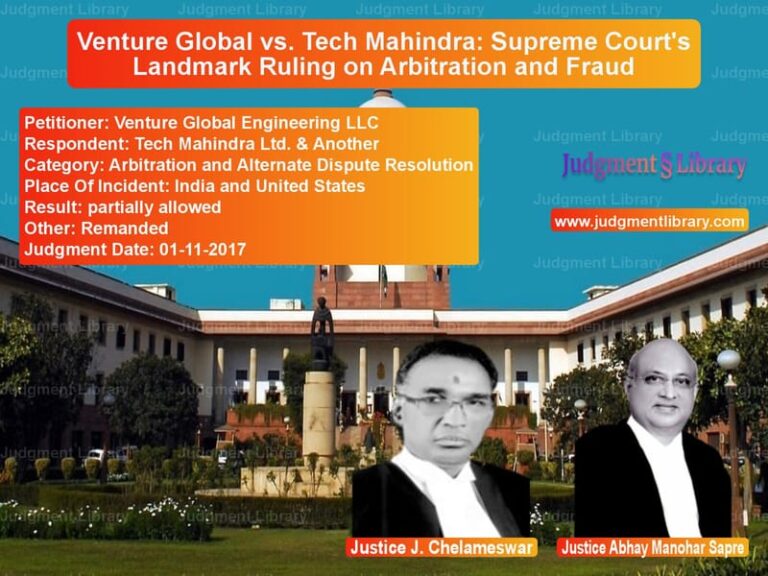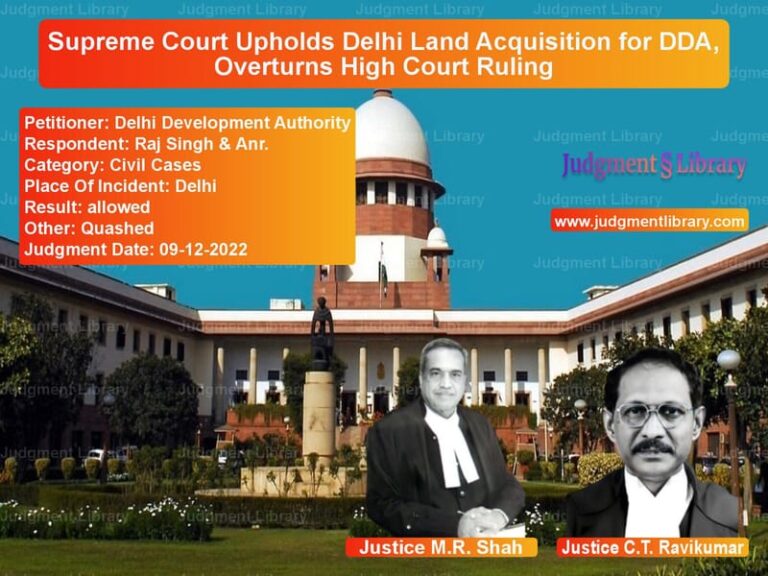Supreme Court Quashes Criminal Proceedings in Property Dispute: Key Takeaways
The Supreme Court of India recently delivered a significant judgment in the case of Rikhab Birani & Anr. vs. State of Uttar Pradesh & Anr., pronounced on April 16, 2025, by Justices Sanjiv Khanna and Sanjay Kumar. The case revolved around a property dispute between the appellants, Rikhab Birani and Sadhna Birani, and the respondent, Shilpi Gupta, which had escalated into criminal proceedings. The Court’s decision highlights the critical distinction between civil disputes and criminal offenses, particularly in cases involving breach of contract and allegations of cheating.
The dispute originated from an oral agreement in June 2020, where the appellants agreed to sell Roti Godown No. 28/27, Birhana Road, Kanpur, to Shilpi Gupta for ₹1,35,00,000. According to Gupta, she paid ₹19,00,000 as part of the sale consideration, but the appellants claimed she failed to pay the agreed 25% advance by the stipulated date. A cheque of ₹10,00,000 issued by Gupta also bounced due to insufficient funds. Subsequently, the appellants sold the property to another buyer for ₹90,00,000, citing changed circumstances and alleging losses of ₹45,00,000 due to Gupta’s default.
Instead of pursuing civil remedies, Gupta approached the criminal courts, filing complaints under Section 156(3) of the Cr.P.C. and later directly registering an FIR under Sections 420 (cheating), 406 (criminal breach of trust), 354 (assault or criminal force to woman with intent to outrage her modesty), 504 (intentional insult with intent to provoke breach of the peace), and 506 (criminal intimidation) of the IPC. The Metropolitan Magistrate initially dismissed her complaints, holding the matter to be civil in nature. However, after the FIR was registered, a chargesheet was filed, and the Magistrate took cognizance, summoning the appellants. The High Court upheld this decision, prompting the appellants to approach the Supreme Court.
Key Arguments by the Appellants (Rikhab Birani and Sadhna Birani)
The appellants argued that the dispute was purely civil in nature, arising from a breach of contract, and did not warrant criminal prosecution. They emphasized that Gupta had failed to fulfill her contractual obligations, leading to the sale of the property to another buyer. They contended that the allegations of cheating and criminal breach of trust were baseless, as there was no fraudulent intent at the time of entering the agreement. The appellants relied on several Supreme Court judgments, including Lalit Chaturvedi v. State of Uttar Pradesh and Mohammed Ibrahim v. State of Bihar, to assert that the ingredients of cheating under Section 420 IPC were not met.
Key Arguments by the Respondent (Shilpi Gupta)
Gupta maintained that the appellants had deceived her by not refunding the money paid and by selling the property to another buyer. She alleged criminal intent on their part, claiming that they had no intention of honoring the agreement from the outset. However, the chargesheet filed by the investigating officer did not substantiate these allegations with evidence of fraudulent intent or entrustment, as required under Sections 420 and 406 IPC.
Supreme Court’s Analysis and Decision
The Supreme Court meticulously analyzed the legal principles governing the distinction between civil disputes and criminal offenses. The Court reiterated that a breach of contract, without fraudulent or dishonest intent at the time of entering the agreement, does not constitute cheating under Section 420 IPC. Citing V.Y. Jose v. State of Gujarat, the Court observed:
“A contractual dispute or breach of contract per se should not lead to initiation of a criminal proceeding. The ingredient of ‘cheating’, as defined under Section 415 of the IPC, is existence of a fraudulent or dishonest intention of making initial promise or representation thereof, from the very beginning of the formation of contract.”
The Court also referred to Sharif Ahmed v. State of Uttar Pradesh, which outlined the essential ingredients of offenses under Sections 406 and 420 IPC. It noted that the chargesheet in the present case was bereft of particulars and evidence to establish these offenses. The Court emphasized that the Magistrate must exercise caution while issuing summons, ensuring that criminal proceedings are not misused to pressure parties in civil disputes.
In its judgment, the Court stated:
“The chargesheet in the present case is bereft of particulars and details required and mandated in terms of Section 173(2) of the Cr.P.C. It merely reproduces the contents of the FIR… Clearly, the ingredients of the aforesaid [offenses] are not established and made out.”
The Supreme Court allowed the appeal, quashing the FIR and all subsequent proceedings. It imposed costs of ₹50,000 on the State of Uttar Pradesh for repeatedly allowing civil disputes to be converted into criminal cases, contrary to established legal principles. The Court clarified that its decision did not affect any civil remedies available to the parties.
Conclusion
This judgment underscores the importance of distinguishing between civil and criminal wrongs, particularly in contractual disputes. It serves as a reminder to law enforcement and judicial authorities to scrutinize allegations carefully before initiating criminal proceedings. The decision reinforces the principle that criminal law should not be used as a tool to resolve civil disputes, ensuring that the legal process is not abused for ulterior motives.
Petitioner Name: Rikhab Birani and Sadhna Birani.Respondent Name: State of Uttar Pradesh and Shilpi Gupta.Judgment By: Justice Sanjiv Khanna, Justice Sanjay Kumar.Place Of Incident: Kanpur, Uttar Pradesh.Judgment Date: 16-04-2025.Result: allowed.
Don’t miss out on the full details! Download the complete judgment in PDF format below and gain valuable insights instantly!
Download Judgment: rikhab-birani-and-sa-vs-state-of-uttar-prade-supreme-court-of-india-judgment-dated-16-04-2025.pdf
Directly Download Judgment: Directly download this Judgment
See all petitions in Fraud and Forgery
See all petitions in Property Disputes
See all petitions in Contract Disputes
See all petitions in Judgment by Sanjiv Khanna
See all petitions in Judgment by Sanjay Kumar
See all petitions in allowed
See all petitions in Quashed
See all petitions in supreme court of India judgments April 2025
See all petitions in 2025 judgments
See all posts in Criminal Cases Category
See all allowed petitions in Criminal Cases Category
See all Dismissed petitions in Criminal Cases Category
See all partially allowed petitions in Criminal Cases Category

